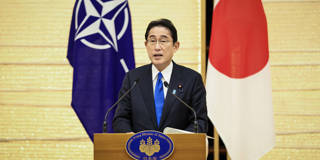 Takashi Aoyama/Getty Images
Takashi Aoyama/Getty Images
日本应当拥有一个核分享协定吗?
Koichi Hamada
发自纽黑文——第二次世界大战改变了世界,而日本则是受改变最大的那个。作为世界上唯一遭受过原子弹荼毒的国家,日本抛弃了在过去几十年间决定其国内政治的军国主义意识形态,于1947年通过了一部主要由美国人起草的和平主义宪法,正式放弃了一个主权国家的战争权,同时不再以武力威胁或武力作为解决争端的手段,当然也不会寻求成为一个核大国。
但尽管世界在随后几十年里发生了深刻的变化,日本的安全政策基本没变。日本的安全仍然是美国的责任,前者承诺在后者受到武装袭击时提供保护,并因此在日本维持着大量驻军和几个基地,并将其核保护伞延伸到了日本。
即便如此,这对许多仍然矢志于和平主义的日本人来说还是太过军国主义了。他们也经常对美国驻日基地提出抗议。当首相岸信介于1960年试图增加本国在自身防御中的作用时就引发了学生们的抗议,当时就连大学期间不太热衷于各种活动的我也参加了示威。在后来的岁月里我偶尔会写一些评论文章去用博弈论思维为冷战期间的和平主义辩护——这使我成为媒体上鼓吹这种方法的众多声音之一。
https://prosyn.org/RN5SXDkzh
To continue reading, register now. It’s free!
Register Now
Already have an account?
Log in



发自纽黑文——第二次世界大战改变了世界,而日本则是受改变最大的那个。作为世界上唯一遭受过原子弹荼毒的国家,日本抛弃了在过去几十年间决定其国内政治的军国主义意识形态,于1947年通过了一部主要由美国人起草的和平主义宪法,正式放弃了一个主权国家的战争权,同时不再以武力威胁或武力作为解决争端的手段,当然也不会寻求成为一个核大国。
但尽管世界在随后几十年里发生了深刻的变化,日本的安全政策基本没变。日本的安全仍然是美国的责任,前者承诺在后者受到武装袭击时提供保护,并因此在日本维持着大量驻军和几个基地,并将其核保护伞延伸到了日本。
即便如此,这对许多仍然矢志于和平主义的日本人来说还是太过军国主义了。他们也经常对美国驻日基地提出抗议。当首相岸信介于1960年试图增加本国在自身防御中的作用时就引发了学生们的抗议,当时就连大学期间不太热衷于各种活动的我也参加了示威。在后来的岁月里我偶尔会写一些评论文章去用博弈论思维为冷战期间的和平主义辩护——这使我成为媒体上鼓吹这种方法的众多声音之一。